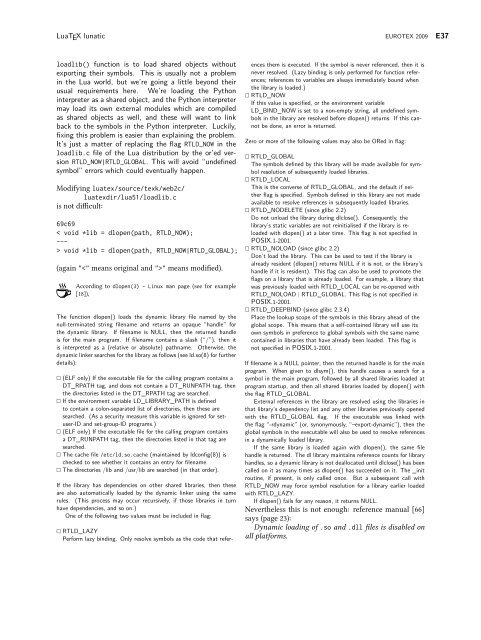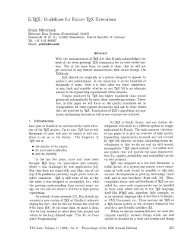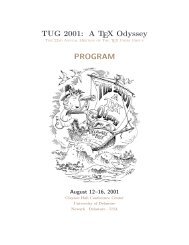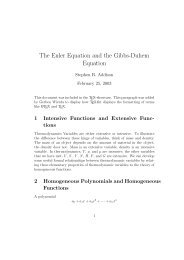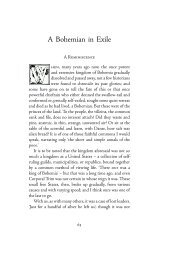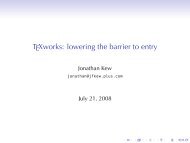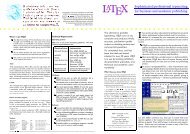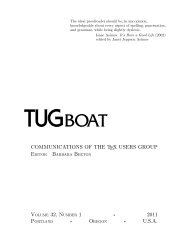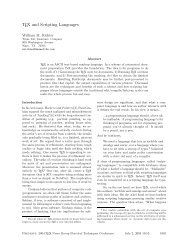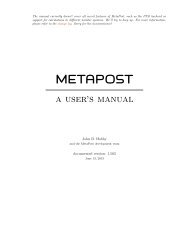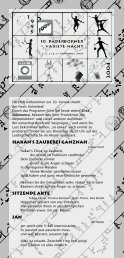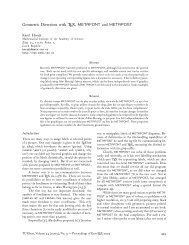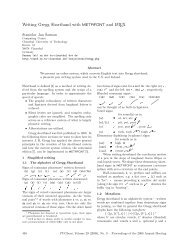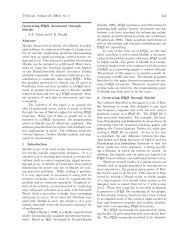Complete issue 30:3 as one pdf - TUG
Complete issue 30:3 as one pdf - TUG
Complete issue 30:3 as one pdf - TUG
Create successful ePaper yourself
Turn your PDF publications into a flip-book with our unique Google optimized e-Paper software.
LuaTEX lunatic EUROTEX 2009 E37<br />
loadlib() function is to load shared objects without<br />
exporting their symbols. This is usually not a problem<br />
in the Lua world, but we’re going a little beyond their<br />
usual requirements here. We’re loading the Python<br />
interpreter <strong>as</strong> a shared object, and the Python interpreter<br />
may load its own external modules which are compiled<br />
<strong>as</strong> shared objects <strong>as</strong> well, and these will want to link<br />
back to the symbols in the Python interpreter. Luckily,<br />
fixing this problem is e<strong>as</strong>ier than explaining the problem.<br />
It’s just a matter of replacing the flag RTLD_NOW in the<br />
loadlib.c file of the Lua distribution by the or’ed version<br />
RTLD_NOW|RTLD_GLOBAL. This will avoid “undefined<br />
symbol” errors which could eventually happen.<br />
Modifying luatex/source/texk/web2c/<br />
luatexdir/lua51/loadlib.c<br />
isnot dicult:<br />
69c69<br />
< void *lib = dlopen(path, RTLD_NOW);<br />
---<br />
> void *lib = dlopen(path, RTLD_NOW|RTLD_GLOBAL);<br />
(again ""means modied).<br />
According to dlopen(3) - Linux man page (see for example<br />
[18]),<br />
The function dlopen() loads the dynamic library file named by the<br />
null-terminated string filename and returns an opaque “handle” for<br />
the dynamic library. If filename is NULL, then the returned handle<br />
is for the main program. If filename contains a sl<strong>as</strong>h (“/”), then it<br />
is interpreted <strong>as</strong> a (relative or absolute) pathname. Otherwise, the<br />
dynamic linker searches for the library <strong>as</strong> follows (see ld.so(8) for further<br />
details):<br />
(ELF only) If the executable file for the calling program contains a<br />
DT_RPATH tag, and does not contain a DT_RUNPATH tag, then<br />
the directories listed in the DT_RPATH tag are searched.<br />
If the environment variable LD_LIBRARY_PATH is defined<br />
to contain a colon-separated list of directories, then these are<br />
searched. (As a security me<strong>as</strong>ure this variable is ignored for setuser-ID<br />
and set-group-ID programs.)<br />
(ELF only) If the executable file for the calling program contains<br />
a DT_RUNPATH tag, then the directories listed in that tag are<br />
searched.<br />
The cache file /etc/ld.so.cache (maintained by ldconfig(8)) is<br />
checked to see whether it contains an entry for filename.<br />
The directories /lib and /usr/lib are searched (in that order).<br />
If the library h<strong>as</strong> dependencies on other shared libraries, then these<br />
are also automatically loaded by the dynamic linker using the same<br />
rules. (This process may occur recursively, if those libraries in turn<br />
have dependencies, and so on.)<br />
One of the following two values must be included in flag:<br />
RTLD_LAZY<br />
Perform lazy binding. Only resolve symbols <strong>as</strong> the code that refer-<br />
ences them is executed. If the symbol is never referenced, then it is<br />
never resolved. (Lazy binding is only performed for function references;<br />
references to variables are always immediately bound when<br />
the library is loaded.)<br />
RTLD_NOW<br />
If this value is specified, or the environment variable<br />
LD_BIND_NOW is set to a non-empty string, all undefined symbols<br />
in the library are resolved before dlopen() returns. If this cannot<br />
be d<strong>one</strong>, an error is returned.<br />
Zero or more of the following values may also be ORed in flag:<br />
RTLD_GLOBAL<br />
The symbols defined by this library will be made available for symbol<br />
resolution of subsequently loaded libraries.<br />
RTLD_LOCAL<br />
This is the converse of RTLD_GLOBAL, and the default if neither<br />
flag is specified. Symbols defined in this library are not made<br />
available to resolve references in subsequently loaded libraries.<br />
RTLD_NODELETE (since glibc 2.2)<br />
Do not unload the library during dlclose(). Consequently, the<br />
library’s static variables are not reinitialised if the library is reloaded<br />
with dlopen() at a later time. This flag is not specified in<br />
POSIX.1-2001.<br />
RTLD_NOLOAD (since glibc 2.2)<br />
Don’t load the library. This can be used to test if the library is<br />
already resident (dlopen() returns NULL if it is not, or the library’s<br />
handle if it is resident). This flag can also be used to promote the<br />
flags on a library that is already loaded. For example, a library that<br />
w<strong>as</strong> previously loaded with RTLD_LOCAL can be re-opened with<br />
RTLD_NOLOAD | RTLD_GLOBAL. This flag is not specified in<br />
POSIX.1-2001.<br />
RTLD_DEEPBIND (since glibc 2.3.4)<br />
Place the lookup scope of the symbols in this library ahead of the<br />
global scope. This means that a self-contained library will use its<br />
own symbols in preference to global symbols with the same name<br />
contained in libraries that have already been loaded. This flag is<br />
not specified in POSIX.1-2001.<br />
If filename is a NULL pointer, then the returned handle is for the main<br />
program. When given to dlsym(), this handle causes a search for a<br />
symbol in the main program, followed by all shared libraries loaded at<br />
program startup, and then all shared libraries loaded by dlopen() with<br />
the flag RTLD_GLOBAL.<br />
External references in the library are resolved using the libraries in<br />
that library’s dependency list and any other libraries previously opened<br />
with the RTLD_GLOBAL flag. If the executable w<strong>as</strong> linked with<br />
the flag “-rdynamic” (or, synonymously, “–export-dynamic”), then the<br />
global symbols in the executable will also be used to resolve references<br />
in a dynamically loaded library.<br />
If the same library is loaded again with dlopen(), the same file<br />
handle is returned. The dl library maintains reference counts for library<br />
handles, so a dynamic library is not deallocated until dlclose() h<strong>as</strong> been<br />
called on it <strong>as</strong> many times <strong>as</strong> dlopen() h<strong>as</strong> succeeded on it. The _init<br />
routine, if present, is only called once. But a subsequent call with<br />
RTLD_NOW may force symbol resolution for a library earlier loaded<br />
with RTLD_LAZY.<br />
If dlopen() fails for any re<strong>as</strong>on, it returns NULL.<br />
Nevertheless this is not enough: reference manual [66]<br />
says (page 23):<br />
Dynamic loading of .so and .dll les is disabled on<br />
all platforms.


